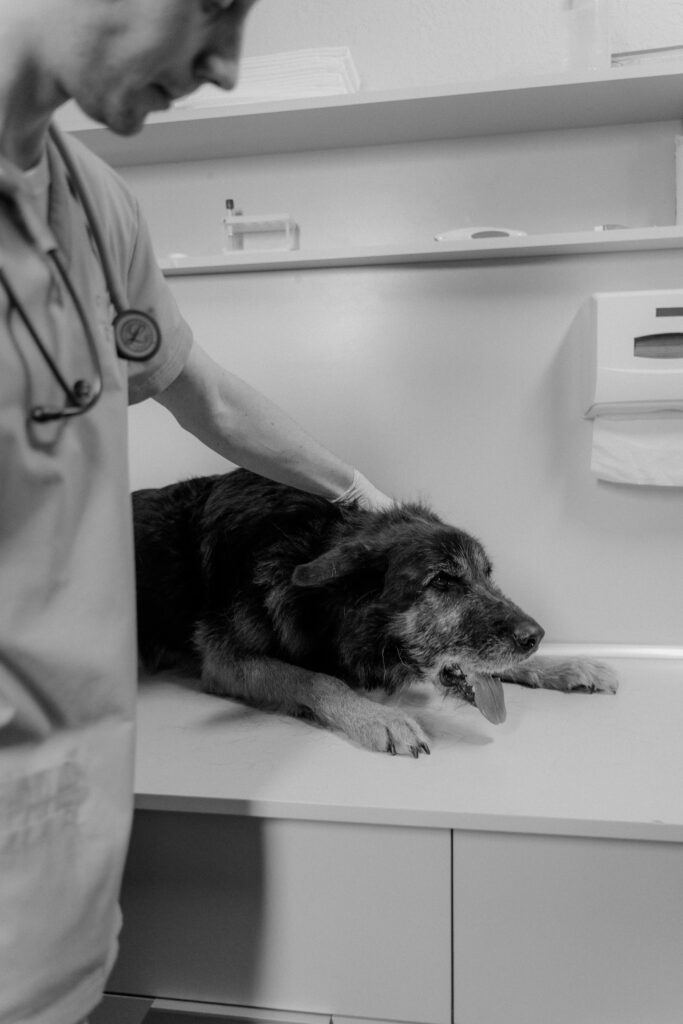Dogs are more than pets—they are family. That’s why when your dog shows signs of neurological distress, such as seizures, it’s a terrifying experience. Can dog food cause seizures? The short answer is yes—certain dog food ingredients and additives have been linked to seizures and other neurological issues in dogs.
In this guide, we’ll explore how ingredients like artificial preservatives, rosemary extract, gluten, and even some so-called “healthy” trends like grain-free dog food can trigger seizures in dogs. We’ll also guide you toward better food choices, share real-life stories of affected pets, and help you understand the best dog food for dogs with seizures.
Dog Seizures and Diet: What’s the Connection?
Many dog owners are surprised to learn that what goes into their pet’s food bowl could be triggering distressing neurological episodes. While genetics, head trauma, and infections are commonly known seizure causes, food remains a hidden culprit. A dog’s nervous system is deeply influenced by what they consume, and poor-quality ingredients can slowly chip away at their health—until it erupts in the form of a seizure. Understanding this connection is the first step in protecting your dog from preventable suffering.
Dog Food Ingredients to Avoid in Seizure-Prone Dogs
Choosing the right dog food isn’t just about flavor or price—it’s a matter of health and sometimes even life or death. Dogs with a history of seizures need special attention when it comes to food labels. Avoiding harmful ingredients can make a significant difference in your dog’s stability and long-term well-being.
1. Artificial Preservatives in Dog Food
Preservatives like BHA, BHT, and ethoxyquin are added to dog food to prolong shelf life, but their impact on your dog’s body can be devastating. These chemicals have been linked to nervous system disorders in dogs, and in seizure-prone pets, they may increase the likelihood and intensity of episodes.
2. Food Additives That Trigger Seizures in Dogs
Artificial colors, flavor enhancers, and emulsifiers may seem harmless on the surface, but they can have a cumulative effect on your dog’s brain. Dogs don’t need food to be brightly colored or artificially flavored—those additives serve the manufacturer more than the pet.
3. Gluten in Dog Food and Seizures
Some dogs react poorly to gluten, just like some humans. The inflammatory response triggered by gluten intolerance can impact multiple systems, including the nervous system. If your dog has unexplained seizures and digestive issues, gluten might be a hidden cause worth investigating.

Rosemary Extract in Dog Food and Seizures
Rosemary extract is commonly used as a “natural” preservative, but natural doesn’t always mean safe. Though it’s a popular herb with antioxidant benefits, it may not be suitable for dogs with epilepsy. Some pet owners have reported seizure activity that diminished after removing rosemary extract from their dog’s diet. While clinical data is limited, it’s worth considering this ingredient as a potential trigger, especially if seizures persist despite other interventions.
Grain-Free Dog Food Seizures: Is It a Myth?
Grain-free diets have surged in popularity, often promoted as cleaner or more ancestral for dogs. But some grain-free formulas replace grains with legumes in high quantities, which can alter taurine absorption and even affect neurological function. While grain-free isn’t inherently bad, it’s important to understand the ingredients replacing grains and whether they contribute to your dog’s condition.
Dog Food and Behavior Changes: A Red Flag
Before a dog has a full-blown seizure, they may exhibit smaller signs of neurological stress. Have you noticed your dog pacing, suddenly acting withdrawn, becoming aggressive, or just not seeming like themselves? These subtle changes in behavior are not always behavioral—they can be biological, triggered by inflammatory ingredients or chemical imbalances from poor-quality food. Don’t ignore these signs—they might be your dog’s way of asking for help.

Best Dog Food for Dogs with Seizures
Switching to the right dog food can often reduce or even eliminate seizures entirely. Look for foods made with clean, whole ingredients—no artificial additives, preservatives, or questionable fillers.
Key Characteristics:
High-quality seizure-safe dog food should prioritize limited ingredient formulas, include omega-3s like fish oil for brain support, and use real meat as the first ingredient. Avoid soy, wheat, corn, and anything listed as “by-products.”
Top options include: (H4)
Fresh or lightly cooked meals, vet-prescribed neurological formulas, or well-reviewed limited-ingredient kibbles can be life-changing for your pet. Consider foods with no rosemary extract, no gluten, and with added antioxidants.
Related: See our guide to zignature venison canned dog food, which avoids many common seizure triggers.
Raw Diet vs Kibble for Seizure-Prone Dogs
The raw vs. kibble debate isn’t just about preference—it’s about results, especially for dogs with special needs.
Raw Diet Benefits:
A properly balanced raw diet eliminates most preservatives, artificial additives, and fillers. This reduces the toxic load on your dog’s body and may improve immune and neurological function. Some owners report seizure reduction within weeks of switching.
Risks:
Handling raw meat requires strict hygiene, and improper ratios of nutrients can lead to deficiencies. It’s not a one-size-fits-all solution and must be customized with the help of a professional.
Kibble Pros:
High-quality kibble can still be a good option if you choose wisely. Many newer brands are removing synthetic additives and focusing on whole food-based ingredients. Always read the label, and avoid anything you wouldn’t eat yourself.
Bulk buyers: Discover savings and customization with bulk raw dog food.
What Causes Dog Seizures Besides Food?
Food is a major factor, but not the only one. Genetic epilepsy, liver disease, infections, toxins, head trauma, and even blood sugar fluctuations can cause seizures. It’s essential to work with your vet to conduct proper tests and rule out other causes. But regardless of the trigger, good nutrition supports healing and prevention.

Real-Life Stories: Diet Changes That Stopped Seizures
One dog owner had a 4-year-old Labrador who began having seizures every few weeks. Medications offered temporary relief but came with side effects like drowsiness and vomiting. After researching online forums, the owner switched to a raw diet using halshan raw dog food, cutting out all grains, artificial colors, and preservatives. Within two months, the seizures stopped entirely—and have not returned after over a year.
Another case involved a senior Beagle whose seizures were mild but frequent. The owners transitioned to a grain-free, gluten-free kibble while eliminating treats with food dyes. They also started using fish oil supplements. The dog not only became seizure-free but regained energy and appetite.
These stories aren’t isolated. Many pet owners have witnessed profound improvements just by upgrading their dog’s food. Sometimes the cure isn’t in a pill—it’s in the bowl.

Conclusion: Can Dog Food Cause Seizures? Yes—But You Can Take Control
So, can dog food cause seizures? The evidence—scientific, anecdotal, and behavioral—all says yes. But here’s the good news: what your dog eats is something you have full control over.
Making the right food choices might feel overwhelming at first, but you don’t have to figure it out alone. Consult your vet, read labels carefully, and prioritize real, natural ingredients over processed fillers. Your dog depends on you not just for food—but for a life that’s healthy, happy, and seizure-free.
Take the first step today. Small changes can lead to massive transformations.

Frequently Asked Questions (FAQs)
Can artificial preservatives in dog food cause seizures?
Yes. Artificial preservatives like BHA, BHT, and ethoxyquin have been linked to neurological issues in dogs. These chemicals can disrupt brain function and may lead to seizures, especially in sensitive dogs.
Is rosemary extract in dog food safe for dogs with epilepsy?
It’s best to avoid it. While rosemary extract is a natural preservative, anecdotal evidence suggests it may trigger seizures in dogs prone to epilepsy. Always consult your vet before feeding food containing it.
Should I avoid grain-free dog food for a seizure-prone dog?
Not necessarily. While some grain-free foods have been linked to health issues, they are not direct causes of seizures. The key is to avoid fillers and legumes in excess. Choose grain-free options only if recommended by your vet.
What’s the safest food for dogs with seizures?
The best food is free from artificial additives, uses clean protein sources, and may include brain-supportive nutrients like omega-3s. Consult your vet for a diet tailored to your dog’s specific condition.
Does gluten cause seizures in dogs?
In dogs with gluten sensitivity, yes. Gluten can lead to inflammation, which may affect the brain and cause seizure-like symptoms. Switching to a gluten-free diet may help reduce seizure frequency.
Explore more options like pedigree canned dog food coupons to make better food affordable.
Remember: What you feed your dog can either trigger or tame their neurological health. Choose wisely.
Written by Pure Dog Food Editorial Team
Your trusted source for expert advice on dog nutrition and wellness.

